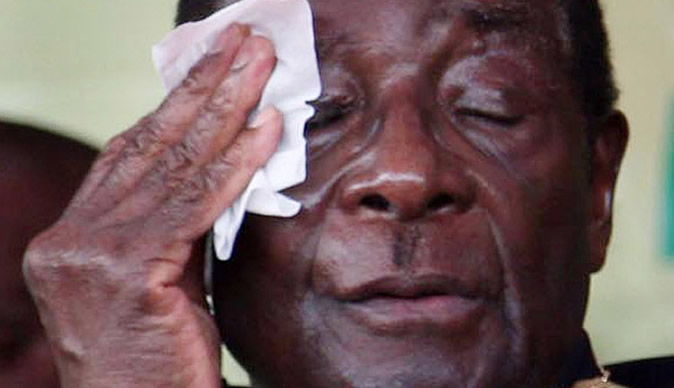- WICKNELL CHIVAYO left school at 15
- DISGRUNTLED Zimbabwe police stage uniform protest.
- MNANGAGWA wife Auxillia drops charges against nine women who boed her in Manicaland
- O.J. Simpson dies of cancer , aged 76.
- South Africa ANC is the cause of ZIMBABWE troubles claims Zimbabwe opposition politician Job Sikhala
Global Finance Magazine Ranks, Zimbabwe, Second Worst World’s Poorest Country.

A GLOBAL business magazine has ranked Zimbabwe one of the two poorest countries in the world in a damning verdict of President Robert Mugabe’s 35-year-rule.
On taking over power at independence in 1980, Mugabe was told by President Samora Machel of Mozambique and President Julius Nyerere of Tanzania that; “You have the jewel of Africa in your hands.”
“Now look after it,” Nyerere and Samora added.
35 years later, Mugabe now in the twilight of his career, has succeeded in disappointing the late liberation luminaries.
The “jewel” is “ruined, dishonoured, disgraced”, said writer Doris Lessing.
The country, a former net food exporter, is perennially hungry; formal industry has all but collapsed and unemployment is around 90 percent – forcing more than a million citizens to resort to vending on the streets.
Confirming Zimbabwe’s precipitous fall from grace, Global Finance magazine ranked the country second bottom of its table of the world’s poorest countries.
The magazine used data from the IMF to rank the world’s countries according to their GDP per capita.
The analysis also used a Purchasing Power Parity (PPP) basis, which takes into account the living cost and inflation rates, in order to compare living standards between the different nations.
The Democratic Republic of Congo (DRC), where citizens earn on average US$394.25 a year, ranks as the poorest country in the world. Above the DRC was Zimbabwe where, in 2013, people earned US$589.25 on average.
The only other SADC country in the bottom ten with Zimbabwe is Malawi, which is ranked 8th poorest with average annual incomes reaching US$893 in 2013.
Zambia, whose Kwacha Zimbabweans loved to mock not so long ago, ranks far higher with annual average incomes more than double Zimbabwe’s at $1,800 in 2013 while in Mozambique citizens earned $1,200 on average in 2013.
Like the DRC, Zimbabwe is potentially rich with vast mineral resources including gold, platinum and diamonds – the latter, according to former mines minister Obert Mpofu, supposed to be earning the country at least $2 billion per year.
But the diamond riches have failed to transform the lives of ordinary Zimbabweans with the question of where the money is going remaining a mystery even to ministers in Mugabe’s own cabinet.
“We hear of so much diamonds, but where does (the money go) to,” asked economic planning minister Simon Khaya Moyo at business conference organised by the Affirmative Action Group (AAG) in Bulawayo last Friday.
Zimbabwe has struggled with a serious economic crisis over the past 15 years with a brief respite during the tenure of the fractious coalition government between Mugabe and his political rivals.
Post the coalition administration, Mugabe, now aged 91, was re-elected on a promise to turn around the economy and create more than two million new jobs.
But nearly two years since the 2013 vote, the government’s ZimAsset economic programme shows no positive impact and the economy stubbornly refuses to mend as companies continue to close and thousands are added to the jobless ranks.
It is claimed that some two million people have since turned to vending in a bid to eke out a living as unemployment soared north of 90 percent.
But the Zanu PF government insists unemployment is below 20 percent, probably reckoning that the two million new vendors equal the two million new jobs promised in the party’s 2013 election manifesto.
Critics blame Mugabe’s inept management of the economy for the crisis as well as the failure to deal with rampant corruption in both the public and private sectors.
But the veteran leader denies culpability, blaming the economic collapse on sanctions imposed by the West over allegations of human rights abuses and electoral fraud – a charge sheet the Zanu PF leader also rejects.
Mugabe is now pinning his hopes on China which he claims will fund multi-billion infrastructure development projects which will help fire the economy and create more jobs.
Opposition parties say there is no hope of economic salvation with Mugabe – clearly struggling with old age and poor health – at the helm of government.
Mugabe’s refusal to retire even as the economy burns has also divided the ruling Zanu PF party with several senior officials, including former vice president Joice Mujuru, recently fired for allegedly plotting to topple the veteran leader. source-newzimbabwe